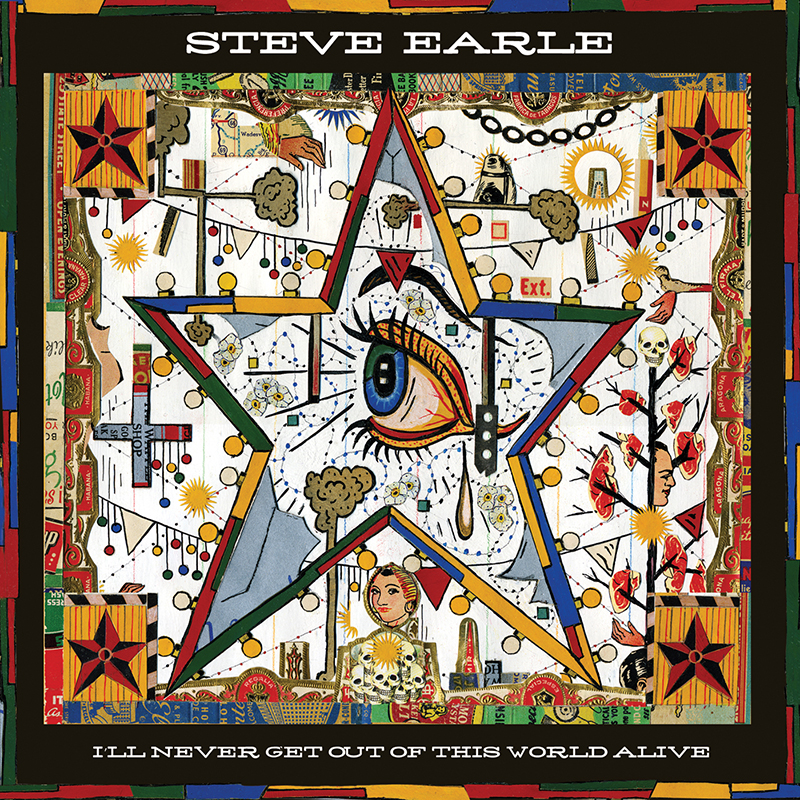
The Lowdown:
April 26, 2011
Steve Earle: I'll Never Get Out of This World Alive
by Jason D. 'Diesel' Hamad
“I’ll never get out of this world alive.”
Truer words have never been sung (unless, of course, you’re an astronaut… which, for the record, you are not). And while no one would ever say that Hank Williams was a prophet (note to self: Ezekiel, Jeremiah, Isaiah and Hank perfect name for bad hippie band), the man did have a touch of that down home country wisdom. Like Will Rogers, he had a way of turning a whimsical phrase that could make you realize something for the first time that you’d thought you’d always known. Unfortunately for Williams, these particular words did turn out to be prophetical: “I’ll Never Get Out of This World Alive” was his last single, and he died just as it reached number one on the charts.
Steve Earle—veteran outlaw and one of the founding fathers of Americana music—has learned the lesson of these words the hard way, yet he’s still willing to tempt fate by simultaneously releasing both an album and a book named after Hank’s final song. But Earle has proved himself to be a survivor, and I doubt his fate will be the same as the Great Hank’s.
Through a toss-and-tumble, up-and-down career that has seen every extreme from memorable hits to incarceration, Earle seems to have gained a little bit of wisdom with each experience, and while he may not have reached nirvana (despite once covering “Breed”), he may finally have reached a point in his life where he’s at peace. His recent albums seem to be an effort to imbue his accumulated wisdom to those who would listen, not in a heavy-handed, authoritarian or prophetic kind of way, but more in the “hey, kid, come here, lemme tell you something I wish I’d known when I was your age” model.
Even as he has risen to become part of the old guard of his particular niche of the music world, some things have stayed the same. He’s still a regular guy looking out for the regular guys out there. Show Mr. Earle a fight between Joe Nobody and the Faceless Megalithic Power and he’ll grab his guitar and jump in on Joe’s side anytime. Another thing that hasn’t changed is the diversity of influences in his music. From the bagpipes in “Copperhead Road” to the banjos, strings and horns on the latest album, Earle seamlessly weaves rock, folk, bluegrass and jazz into his country cloth. Coming on the heels of his Grammy-winning homage to friend, mentor and master lyricist Townes Van Zandt, this T Bone Burnett-produced album contains several gems that demonstrate not only Earle’s musicianship, but also his own skills with the pen.
Prime among these is the second track on the album, “Little Emperor,” which demonstrates several key traits in Earle’s philosophy: a hatred of hypocrisy and fakery, an affinity for the Everyman, and an ability to be lighthearted even in the face of the most serious of topics. Reminiscent of Percy Bysshe Shelley’s “Ozymandias” (“Look on my works, ye Mighty, and despair!”), the song is a mocking, hilarious indictment of those who see themselves as superior to their fellow man. Specifically, it takes on a self-proclaimed emperor at the end of his life as his world comes crashing down and his former friends go running for the hills. The fiddle and banjo-heavy bluegrass rock song never names the ruler in question, although one particular biting line seems to imply a further complication of Earle’s relationship with the George W. Bush administrations since the penning of his love song for Condoleezza Rice (“Condi, Condi”):
No more pomp and circumstance, no more shock and awe.< br/> You’re just a little emperor, that’s all.
As the emperor comes upon his final judgment day Earle ridicules him, asking “How you gonna justify it? Who you gonna call?/ What if it turns out god don’t look like you at all?”
Another standout is the album’s next track “Gulf of Mexico.” The song features an almost operatic old time folk feel with swelling vocals evocative of Pete Seeger. The opening is practically Guthriesque:
Come and gather round me people and a tale to you I’ll tell
Of my father and his father in the days before the spill.
With an endless sky above them and an endless sea below
And every blessing flowin’ from the Gulf of Mexico
The song tells the tale of both the fishermen and the roughnecks in the narrator’s family history and their love of the land and water they worked. True to Earle’s philosophy of we’re all people and we do what we gotta do, there is no blame assigned for the tragedy that strikes, but the horror is evident in his voice as he sings:
As for me, I dreamed of nothin’ in the grand November day
That I stepped out on the drillin’ floor to earn a roughneck’s pay.
Then one night I swear I saw the devil crawlin’ from the hole
And he spilled the guts of hell out in the Gulf of Mexico.
Yet another well crafted highlight is “Molly-O,” a tragic love song in the classic folk mode that features a banjo base with string accents. Written in a minor key, it has a harsh, worrisome feel. It tells of a lover forced to become a highwayman in order to acquire diamonds, pearls and gold to give to his sweetheart, who nevertheless refuses to marry him. In the end he concludes:
Now men have died for lesser things:
Vengeance, country, god, and king.
Someday I’ll swing from a gallows pole.
One final dance for my Molly-O.
The album closes with the song “This City,” featured in the television series Treme, which focuses on life in New Orleans after Hurricane Katrina and in which Earle also serves as an actor. The song has already garnered Grammy and Emmy nominations, and it’s easy to see why. With cutting lyrics, jazz-infused horn accents, and a lack of the sappiness that usually accompanies such songs, it pays tribute to the stoic bravery of those who are still living through the disaster with lines such as:
Blood in the water and hell to pay.
Sky tear open; pain rain down.
Doe’n’t matter, ‘cause come what may
I ain’t ever gonna leave this town.
This city won’t wash away.
This city won’t ever drown.
Other tracks of note include a lively story song, “Waitin’ on the Sky,” the bare-bones blues number “Meet Me in the Alleyway,” and “Heaven or Hell,” featuring Earle’s wife Allison Moorer on backup vocals.
If Earle has any fault, it is that he can often be uneven. When his songs are good (whether they be singles or rarities) they are very, very good, but when they are bad… well, they can be horrid. Examples on this album include “God is God”, an utterly forgettable if not cringe-worthy remnant of his time in a 12-step program meditating on a higher power, and “Every Part of Me,” which is a sappy, unimaginative love song. Not quite as bad is “Lonely Are the Free,” which features interesting lyrics but moves along at such a lethargic pace that the listener is left to wonder whether he’ll live to hear the end.
Despite the slow points, the album amply demonstrates why Steve Earle is counted among the best musicians of our time. While the bulk of these songs lack the pure rocking power of many of those penned in his early outlaw days, they make up for it with finely crafted lyrics and hard-won wisdom. If you like Steve Earle, then you’ll like this album. If you don’t like Steve Earle… well you’re reading the wrong website. Either way, one thing’s for sure: You’ll never get out of this world alive. Wait, two things: you’re definitely not an astronaut, either.
| mp3 | cd | vinyl |
|---|---|---|









Follow @NoSurfMusic